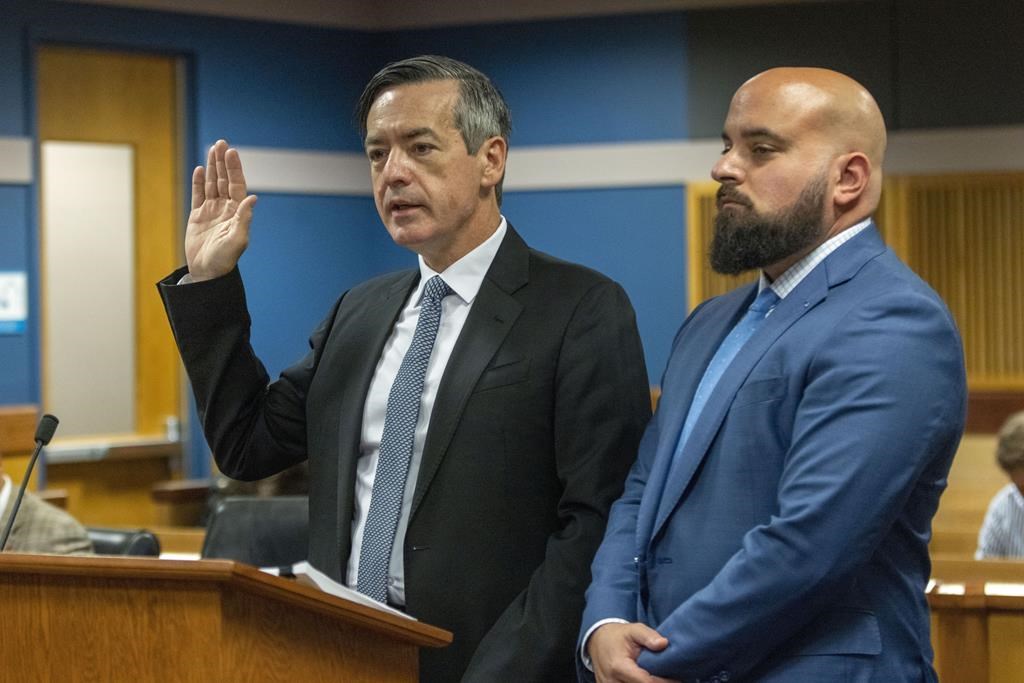Lawyer Kenneth Chesebro pleads guilty over efforts to overturn Trump’s 2020 loss in Georgia

Posted Oct 20, 2023 01:49:56 AM.
Last Updated Oct 20, 2023 05:16:14 PM.
ATLANTA (AP) — Lawyer Kenneth Chesebro pleaded guilty to a felony on Friday just as jury selection was getting underway in his trial on charges accusing him of participating in efforts to overturn Donald Trump’s loss in the 2020 election in Georgia.
Chesebro, who was charged alongside Trump and 17 others with violating the state’s anti-racketeering law, pleaded guilty to one felony charge of conspiracy to commit filing false documents in a last-minute deal, with prosecutors agreeing to dismiss the other charges. His plea came a day after fellow attorney Sidney Powell, who had been scheduled to go to trial alongside him, entered her own guilty plea to six misdemeanor counts.
In Chesebro’s case, he was sentenced to five years’ probation and 100 hours of community service and was ordered to pay $5,000 in restitution, write an apology letter to Georgia’s residents and testify truthfully at any related future trial.
The two guilty pleas — along with a third for a bail bondsman last month — are major victories for Fulton County District Attorney Fani Willis. They allow her to avoid a lengthy trial of just two defendants — which would have given those remaining a peek at her trial strategy — and to whittle down an unwieldy pool of defendants.
Unlike Powell, who was involved in strategy talks with the former president after the election, the indictment does not indicate direct contact between Chesebro and Trump. This could potentially limit any information he could offer prosecutors that would be helpful to them in their case against Trump.
Chesebro’s lawyer, Scott Grubman, said it is entirely up to prosecutors whether his client will be called to testify against others in the case, but he would be surprised if it happens. Asked if Trump should be worried about any testimony Chesebro might offer, Grubman said, “I don’t think so.”
Chesebro, who lives in Puerto Rico, was initially charged with felony racketeering and six other counts as part of a wide-ranging scheme to keep the Republican president in power after he lost the 2020 election to Democrat Joe Biden. The indictment alleges Chesebro coordinated and executed a plan to have 16 Georgia Republicans sign a certificate declaring falsely that Trump won the state and declaring themselves the state’s “duly elected and qualified” electors.
Grubman said after the plea hearing that his client has been “inaccurately described as the architect of some plan to overturn democracy.” He said the plea deal contradicts that.
“I think this plea deal absolutely shows and proves that he was not and never was the architect of any sort of fake elector plan or anything like that,” Grubman told reporters.
For prosecutors, the plea deal assures that Chesebro publicly accepts responsibility for his conduct in the case and removes the uncertainty of a trial by a jury of his peers. It also compels him to testify in future trials in the case. Based on court filings by prosecutors, that could include communications he had with Trump’s campaign lawyers and close associates, including co-defendant Rudy Giuliani, the former New York mayor and a Trump attorney.
Trump attorney Steve Sadow said it appears as if Chesebro’s guilty plea “was the result of pressure by Fani Willis and her team and the prosecution’s looming threat of prison time.”
He also reiterated what he said after Powell’s guilty plea, which similarly included a commitment to testify in future trials: “Once again, I fully expect that truthful testimony would be favorable to my defense strategy.”
Chesebro was also an unnamed, unindicted co-conspirator in an indictment filed against Trump by Justice Department special counsel Jack Smith. The former president was charged in that case with trying to illegally overturn the results of the 2020 election and block the peaceful transfer of power.
The federal indictment alleges that “co-conspirator 5” — identified as Chesebro by The Associated Press through court and congressional records and other means — “assisted in devising and attempting to implement a plan to submit fraudulent slates of presidential electors to obstruct the certification proceeding.”
By the time Chesebro agreed to the plea deal, prospective jurors at his planned trial had already been sworn in and filled out an extensive questionnaire. He had been set to be tried alongside Powell after each filed a demand for a speedy trial.
As part of Powell’s deal, she will serve six years of probation, will be fined $6,000 and will have to write an apology letter to Georgia and its residents. She also recorded a statement for prosecutors and agreed to testify truthfully against her co-defendants at future trials.
A lower-profile defendant in the case, bail bondsman Scott Graham Hall, pleaded guilty last month to five misdemeanor charges. He was sentenced to five years of probation and agreed to testify in further proceedings.
All of the other defendants, including Trump and his White House chief of staff Mark Meadows, have pleaded not guilty.
Grubman said this deal means his client will get to return to his family and his life without spending a day behind bars. He said he believes that getting prosecutors to agree on the record that this was not a crime of “moral turpitude” should allow Chesebro to continue practicing law.
Prosecutors allege that Chesebro unlawfully conspired with Trump and lawyers associated with his campaign to have the group of Georgia Republicans sign the false elector certificate and to submit it to various federal authorities. He also communicated with Trump campaign lawyers and Republican leaders in other swing states won by Biden to get those states to submit false slates of electors as well, prosecutors alleged.
That included writing memos advocating for Republicans in those states to meet and cast electoral votes for Trump and providing detailed instructions for how the process should be carried out. In an email to Giuliani, he outlined strategies to disrupt and delay the joint session of Congress on Jan. 6, 2021, during which electoral votes were to be certified. He wrote that those strategies were “preferable to allowing the Electoral Count Act to operate by its terms.”
Kate Brumback, The Associated Press








